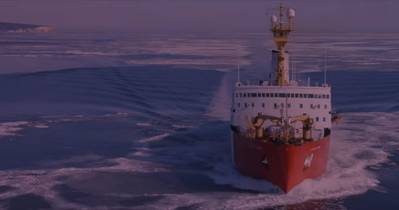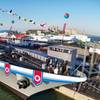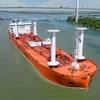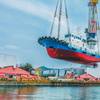Canada Pays Tribute to Inuit Culture with Icebreaker Names
Canada’s Minister of Fisheries, Oceans and the Canadian Coast Guard, Diane Lebouthillier, has released the names of the Canadian Coast Guard’s two future Polar Icebreakers: the CCGS Arpatuuq and CCGS Imnaryuaq.
The vessels’ names were chosen in collaboration with Inuit Tapiriit Kanatami for their cultural significance to Inuit. The CCGS Arpatuuq references Akpatok Island, an uninhabited island in Nunavik, on the northern coast of Quebec. The island is an important geographical landmark in Ungava Bay that has been used by Inuit of Nunavik for centuries. It is named for the Akpa, a thick-billed murre that is one of the many seabird species in the region.
The CCGS Imnaryuaq’s namesake is a cape located at the southern end of Banks Island that extends into the Amundsen Gulf. Also referred to as Nelson Head and meaning “big cliff,” Imnaryuaq extends over 300 meters almost vertically from the water’s edge and is a culturally significant area for Inuvialuit.
The construction of the two Polar Icebreakers is projected to support approximately 300 jobs per vessel at the shipyards, and 2,500 jobs across the marine supply chain. Vancouver Shipyards in British Columbia will build one Polar Icebreaker, and Chantier Davie in Lévis, Quebec, will build the other Polar Icebreaker.
Once built, the Polar Icebreakers will be the largest vessels in the Canadian Coast Guard’s fleet of the future. The CCGS Arpatuuq and CCGS Imnaryuaq will enable the Canadian Coast Guard to operate in the Canadian Arctic year-round to support Indigenous Peoples and Northern communities, Arctic sovereignty, high Arctic science and emergency response.
Lebouthillier also marked the launch of the Canadian Coast Guard’s Arctic Strategy this week. The Strategy outlines the Canadian Coast Guard’s vision for the Arctic region over the next decade and was developed in collaboration with Inuit, First Nations and Métis peoples. As noted in the Strategy, the Canadian Coast Guard is enhancing its year-round presence in the Arctic with new programs, a modernized fleet, an equitable and representative workforce and policies that are made in the North, by the North and for the North.
Lebouthillier announced that year two of the Canadian Hydrographic Service’s dedicated mission to conduct hydrographic surveys in the Arctic will launch from Iqaluit on August 26, 2024. These surveys are critical to advance knowledge of the Arctic seabed, and the data collected plays a significant role in enhancing navigational safety in a challenging marine environment.
The announcements follow the recent name unveiling and launch of the Canadian Coast Guard’s new Offshore Oceanographic Science Vessel, the CCGS Naalak Nappaaluk, at Vancouver Shipyards in British Columbia. The CCGS Naalak Nappaaluk pays tribute to an esteemed Inuk Elder and was chosen in collaboration with Inuit Tapiriit Kanatami.















